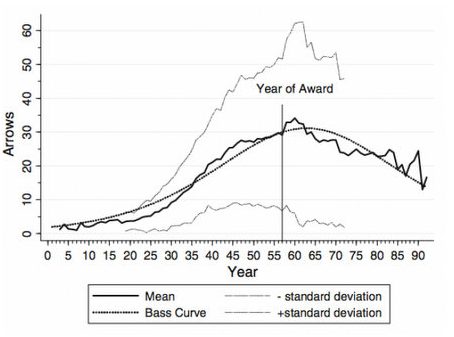October 2013
The announcement of the Nobel Prize winners every October means that at least once a year a handful of economists become relatively popular, at least momentarily. Like many public announcements, the lasting impact of this announcement can be measured using the principles of an event study. In this case, one measure of this spike in popularity is web search data reported by Google Trends. So how long can these highly deserving economists expect to enjoy their sudden spotlight?
The chart below traces each Nobel laureate’s popularity before, during, and after the Prize was announced using an event study framework (see Which “Presidential Name” is Most Popular? for a discussion of event studies). The chart shows search data for every laureate who received an award in the field of Economics since 2009 (except Peter Diamond and Elinor Ostrom because these laureates’ data aren’t available on a monthly and consistently-scaled basis).
Prior to the Prize announcement, Google users rarely searched for the future Nobel laureates. This isn’t surprising because most economists are virtually unknown to the general public, especially before they receive a Nobel Prize. As expected, the month in which the Prize is announced coincides with a large spike in search frequency. However, this popularity doesn’t last long. Shortly after the Prize is announced, public interest subsides quickly and drastically.
While this large spike is certainly attention-grabbing, its massive size obscures that there is a longer lasting, although much less pronounced, impact. The below chart simplifies the before/after comparison by eliminating the spike and reporting the average monthly search frequency before and after the Prize was announced. Although search frequency on this basis is more modest, on a percentage basis the increases in search popularity are substantial. Alvin Roth, for example, saw his average monthly popularity increase by 550% following the announcement of his Prize.
In spite of these relative increases, the first chart above and our event study suggests that the popularity decreases so rapidly that the month immediately following the announcement has search results that are on average ten times smaller than the spike.
According to a recent academic paper, this sudden drop off in popularity is not only attributable to the notoriously short attention span of pop culture. Economics laureates’ popularity in academic circles is also fleeting. The paper finds that, on average, Nobel Prize-winners’ citation counts increase modestly following the award and then decline quickly and monotonically thereafter. Winning economists no doubt value their Prize highly, as it recognizes and rewards their academic careers in a way that few other prizes or honors can. However, the below event study (excerpted from the paper) may serve to manage their expectations of lasting popularity.
Fulcrum Inquiry is experienced in damage analysis, sampling and surveys, and quantitative models.



